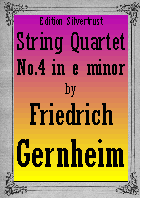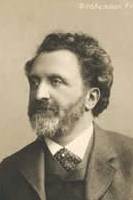Presents
Friedrich Gernsheim
 |
 |
There are no recordings of this work. Wilhelm Altman, perhaps the foremost expert on string chamber music, has only the the highest praise for this work as you can read below. You may hear some of his other works for which we do have soundbites at the link below Link to other Gernsheim Works |
String Quartet No.4 in e minor, Op.66
“Gernsheim's Fourth Quartet was composed in 1899 and published in 1900. The thematic material and other aspects are particularly fine. The main theme of the opening movement, Allegro ma molto moderato ed espresso, immediately makes a strong impression while the lyrical second subject is more introspective. The Allegretto scherzando, ma non troppo vivo e sempre molto leggiero which comes next is a highly spirited, piccant-sounding scherzo with a trio that has a charming melody full of feeling. A particularly captivating Theme and Variations (Andante grave) serves as the third movement. The use of tone color is particularly striking. The finale, Allegro con brio, begins in the fashion of a quick military march. The middle section is calmer but full of warmth."---Wilhelm Altmann writing in his Handbook for String Quartet Players.
Friedrich Gernsheim (1839-1916) is a composer whose music was held in the highest regard by critics during his lifetime. No less an authority than Wilhelm Altmann, perhaps the most influential chamber music critic of all time, has written that Gernsheim’s chamber music is poetic and of a high intellectual content. But Gernsheim had two misfortunes, which led to his music not obtaining the reputation it might have. The first was to be born within a decade of Brahms. A misfortune because, in what is surely an extraordinary phenomenon, virtually every composer in the German-speaking countries born within a decade either side of Brahms were so eclipsed by him that their reputation and music all but disappeared when that era was over. Names such as Rheinberger, Reinecke, Kiel, Bruch, Dessoff, and Herzogenberg, among many others, come to mind. The second misfortune was that being Jewish, his music was officially banned during the Nazi era, which insured that it would fall into oblivion. It is only now, close to a century after his death that it is being rediscovered with great delight.
Gernsheim, somewhat of a piano and violin virtuoso as a child, was eventually educated at the famous Leipzig Conservatory where he studied piano with Ignaz Moscheles and violin with Ferdinand David. After graduating, he continued his studies in Paris, getting to know Saint Saëns, Lalo, Liszt and Rossini. Despite his admiration for France and the French, he returned to Germany and during the course of his life, he held academic and conducting positions in Cologne, Rotterdam and finally Berlin. He used his position as a conductor to advance the cause of Brahms’ music. The two, while not close friends, carried on a correspondence for many years during which it was clear that Brahms had considerable respect and admiration for Gernsheim’s work. An accolade which was, in Brahms’ case, no mere flattery as Brahms only very rarely praised the works of other composers.
This is a first rate quartet which certainly belongs in the concert hall but which should certainly be investigated by amateurs. It is our pleasure to reintroduce it.
Parts: $24.95